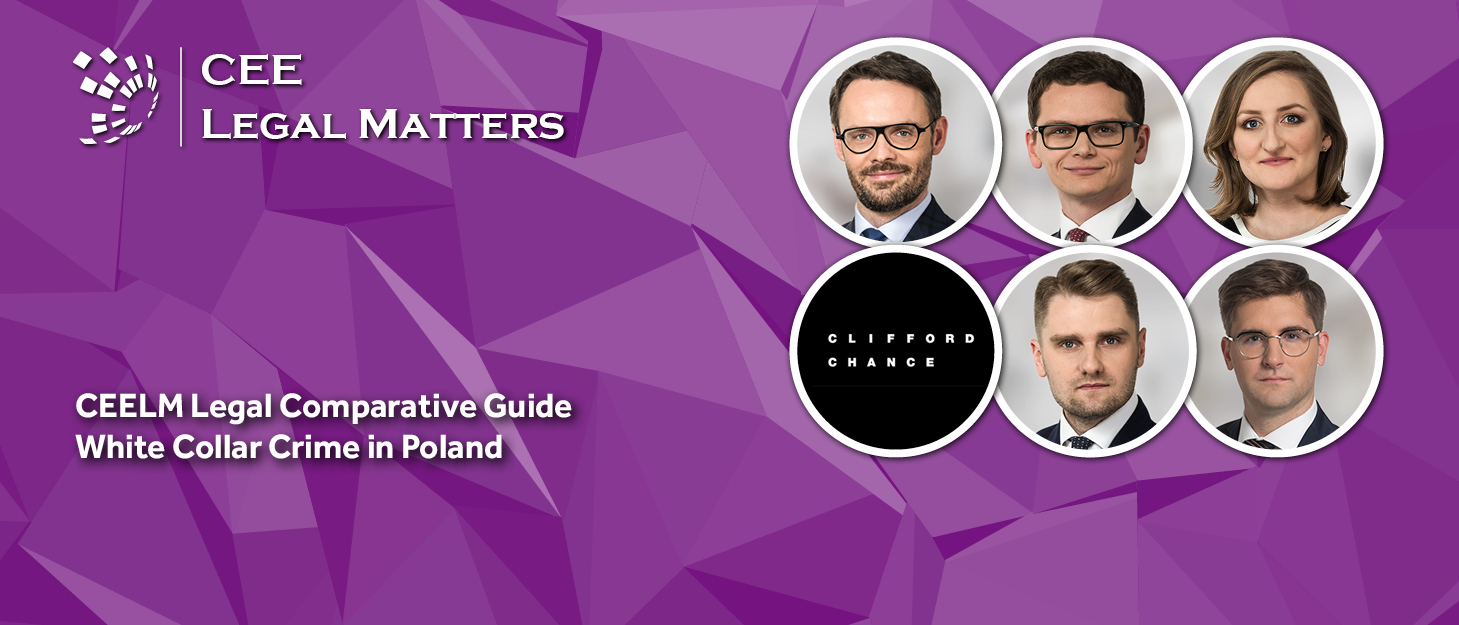Contributed by Clifford Chance.
1. Legal Framework
1.1. What is the legal framework for bribery and corruption in your jurisdiction?
The majority of criminal offenses regarding corruption are penalized under the Polish Criminal Code. They include, in particular, accepting and offering benefits in connection with the performance of a public function (also in a foreign state or an international organization), influence peddling, exceeding of authority by a public official, and commercial bribery.
Corruption-related criminal offenses are also provided for in, for example, the Act on the Reimbursement of Medications, which prohibits accepting and offering benefits in exchange for activities influencing the level of sales of medications or medical devices subject to reimbursement from public funds as well as in the Act on Sports, which penalizes bribery related to sports competitions.
Legal entities might be liable for corruption under the Act on the Criminal Liability of Collective Entities for Punishable Offenses.
1.2. Which international anti-corruption conventions apply?
Poland is a party to, and a member of, the following international anti-corruption conventions and organizations:
- The United Nations Convention against Corruption, adopted by General Assembly Resolution 58/4 of October 31, 2003, signed by Poland on December 10, 2003;
- The OECD Convention on Combating Bribery of Foreign Public Officials in International Business Transactions, which entered into force on November 7, 2000;
- The Council of Europe Civil Law Convention on Corruption adopted on November 4, 1999, which entered into force on November 1, 2003;
- The Council of Europe Criminal Law Convention on Corruption adopted on January 27, 1999, which entered into force on April 1, 2003;
- The Additional Protocol to the Criminal Law Convention on Corruption adopted on May 15, 2003, in force in Poland since August 1, 2014;
- The Organization for Economic Co-operation and Development Convention on Combating Bribery of Foreign Public Officials in International Business Transactions, adopted on December 17, 1997, in force in Poland since November 7, 2000.
1.3. What is the definition of bribery?
Bribery can be either active or passive. Active bribery involves giving or promising to give a material or personal benefit to a person in relation to that person’s holding a public office. Passive bribery, on the other hand, consists in accepting a material or personal benefit, or a promise thereof, in connection with performing a public function.
A bribe is a material or personal benefit. There is no minimal value set to determine when such a benefit should be considered a bribe. Polish criminal law does not provide for a definition of a material or personal benefit and limits itself in this scope to the statement that a material or personal benefit is a benefit received for both oneself and for another person (not necessarily a relative). The most obvious form of giving a financial benefit is the handing over of money (in cash). However, this might also refer to any increase in assets or decrease in liabilities. There are also views that winning a tender could be considered as being a material benefit.
Accepting or offering a bribe is punishable, providing that it is connected with holding a public office. There has to be a link between the bribe and the performance of the duties of a public official, for example, payment in return for a favorable decision. Such connection can be established also if an official is rewarded for his/her previous conduct that was not related to the bribe. The recipient of a bribe does not have to be the person actually authorized to issue a decision or perform an action. It is sufficient if he/she can influence the decision in any way.
Bribery is a punishable offense regardless of the motivation of the perpetrator and the material value of the benefit.
Undertaking to assist in dealing with a matter in exchange for a financial benefit by invoking influence in the government or local government institution, in an international or national institution, or in a foreign organizational unit having public funds at its disposal or by giving another person the impression of such influence or confirming the belief of that person in such influence (passive paid patronage) is subject to a penalty. It is also an offense to grant or promise to grant a benefit in exchange for mediation in the above-mentioned institutions, with the intention of illegally influencing a decision, or causing a person holding a public office to act or omit to act, in connection with the holding of that office.
1.4. Is private sector bribery covered by law? If yes, what is the relevant legislation?
The Polish Criminal Code also provides for criminal liability in the case of corrupt conduct in business relations.
Accordingly, anyone who, while in a managerial position in an organizational unit conducting business activity, or in an employment relationship, a service contract, or a contract for the performance of a specific task, demands or accepts a financial or personal benefit or the promise thereof, in return for abusing the authority granted to him/her, or for failing to perform an obligation, could inflict material damage to the unit, or which could constitute an act of unfair competition or an unacceptable act of preference for the buyer or recipient of goods, services or benefits, is liable to imprisonment.
1.5. What is the definition of a public official and a foreign public official? Are employees at state-owned or state-controlled enterprises treated differently? Are there official lists of public officials, offices, or state-owned or state-controlled enterprises?
For the purpose of the anti-corruption regulations, the Polish Criminal Code uses the term “a person performing a public function,” which includes mainly persons holding public functions, such as:
1. “Public Officials,” that is:
- the President of the Republic of Poland;
- a member of the lower (Sejm) or upper chamber (Senate) of the Polish Parliament or of a local government agency;
- a Member of the European Parliament;
- a judge, lay judge, public prosecutor, an official of a financial authority responsible for conducting preparatory proceedings or of an agency superior to such financial authority, a notary, a court enforcement officer (bailiff), an official receiver, an insolvency administrator and/or trustee, a member of a disciplinary panel adjudicating on specific matters on the basis of a statute;
- an employee of a government agency, other state agency, or local government agency, unless such person only performs auxiliary functions, as well as any other person to the extent that person is authorized to issue decisions in the administrative course of procedure;
- an employee of a state or local government inspection authority, unless such person only performs auxiliary functions;
- a holder of a managerial position in a different government institution;
- an officer of an agency designated for the protection of public security or a prison officer;
- a person doing active military service; or
- an employee of an international criminal court, unless such person only performs auxiliary functions.
2. persons holding a position with a foreign government or a supra-national organization;
3. members of local government administration bodies;
4. other persons whose competencies or duties concerning public activity are specified by Polish law (e.g. members of arbitral tribunals).
The term “a person performing a public function” also covers persons who are not public officials but are employed by organizational units with public funds at their disposal (except when the person performs only service-type work) (e.g. members of tender committees in public procurement procedures).
For the purpose of the applicable anti-corruption provisions officers of state-owned or state-controlled enterprises are not specifically listed as persons holding a public function. Such officers may be treated as persons holding a public function when their specific actions directly involve public funds, or they can otherwise be seen as holding a public function. This is generally confirmed by the prevailing case law. However, there are some divergent views, e.g. that the head of the credit department or a deputy director of a branch of a commercial bank in which the State Treasury is a majority shareholder is considered a person holding a public function owing to the fact that the bank’s lending activities involve public funds.
1.6. Are there any regulations on political donations?
The financing of political parties in Poland is regulated by the Act on Political Parties. The sources of financing of political parties are transparent and open to public scrutiny.
A political party may receive funds only from individuals, meaning that it cannot accept contributions from other entities, including corporate entities. Moreover, a political party can accept funds only from Polish citizens. There is also a limit on the contributions that can be made by one person. The total sum of political contributions cannot exceed 15 times the national minimum wage in a given year.
1.7. Are there any defenses available?
In the case of individuals, in some situations, custom may constitute a defense against criminal liability for bribery in the public sector (see Section 2.4).
There is also a quasi-defense with respect to active bribery (offering a bribe), active corruption in the private sector, and peddling influence in exchange for a benefit. The person giving or offering a bribe will not be subject to criminal prosecution provided that: (i) the bribe or its promise was accepted, (ii) it was reported to the authorities before they learned about it, and (iii) the offender disclosed all the relevant circumstances of the offense. The form in which the offender reports the offense to the authorities is of no importance.
In the case of corporate entities, although Polish law does not expressly provide for a compliance defense, such defense may be inferred from the corporate criminal liability regulations (including liability for bribery). The liability based on the current Act on Criminal Liability of Collective Entities for Punishable Offenses is dependent on fault, which is either fault in selection or organizational fault (see Section 4.1). In practice, having an effective anti-bribery compliance program in place may enable the corporate entity to argue that organizational fault cannot be attributed to it. In such a case, the criminal liability of the corporate entity would be excluded. However, the use of this potential compliance defense remains largely untested.
1.8. Is there an exemption for facilitation payments?
Polish law does not regulate facilitation payments. There is no exemption in Poland regarding facilitation payments, and such payments are likely to fall under the statutory definition of an offense of bribery.
1.9. What are the criminal sanctions for bribery? Are there any civil and administrative sanctions related to bribery cases?
In the case of individuals, the criminal consequences of bribery may include the following penalties: a limitation of liberty for a period from one month to two years, the deprivation of liberty for a period from six months to 12 years, and a fine of up to PLN 1.08 million.
Additionally, the court may also impose penal measures such as deprivation of public rights, prohibition from occupying a specific professional position, practicing a specific profession, conducting a specific business activity, and publication of the judgment in a particular manner if this is appropriate due to the social impact of the judgment.
When imposing a penalty, the court considers the circumstances as well as the type and the extent of consequences of the offense. The penalty will be higher if the bribe was of a substantial value or was accepted in exchange for unlawful behavior.
There are no civil or administrative sanctions against regarding crimes of corruption, however, corruption can result in civil liability for damages, employee responsibility, or disciplinary responsibility of public officials.
1.10. Does the national bribery and corruption law apply beyond national boundaries?
Yes. The national bribery and corruption law applies to Polish citizens even if they committed an offense beyond the national boundaries. It also applies to foreigners involved in bribery and corruption related to Polish interests or involving Polish public officials.
1.11. What are the limitation periods for bribery offenses?
The penal responsibility for bribery offenses expires after 15 years from the time they were committed. If within this timeframe criminal proceedings are initiated, the term is extended by an additional 10 years.
1.12. Are there any planned amendments or developments to the national bribery and corruption law?
The Polish government is considering significant amendments to the provisions regarding corporate criminal liability vastly enlarging the scope of the liability of companies. The legislative process is on hold with no indication of when it will be renewed.
2. Gifts and Hospitality
2.1. How are gifts and hospitality treated?
There is no clear boundary in the provisions of law, case law, or views of legal scholars between a small socially acceptable gift and active bribery.
2.2. Does the law give any specific guidance on gifts and hospitality in the public and private sectors?
Generally, there is no specific guidance in this respect.
2.3. Are there limitations on the value of benefits (gifts and hospitality) and/or any other benefit) that may be given to a government/public official? If so, please describe those limitations and their bases?
The prescribed limitations on the value of benefits (such as hospitality, travel, and entertainment) that may be given to persons performing public functions are only included in the Polish Pharmaceutical Law, which allows giving or accepting items with a value under PLN 100 and relevant to the practice of medicine or pharmacy, bearing a mark advertising a given firm or medicinal product. Other than the above situations, there are no generally prescribed limitations on the value of benefits (such as hospitality, gifts, travel, and entertainment) that may be given to public officials.
2.4. Are there any defenses or exceptions to the limitations (eg. reasonable promotional expenses)?
According to legal scholars and case law, in some situations custom may constitute a defense against criminal liability for an offense of corruption in the public sector. Therefore, small customary gifts for public officials may be considered permitted. Essentially, this may be the case when the giving of such gifts/hospitality is: (i) customary and socially accepted as a gesture of courtesy; (ii) of small value; and (iii) provided as an expression of gratitude, i.e. after a given service/transaction with a person holding a public office has been completed and assuming that such gift/entertainment was not promised, suggested, or expected in relation to the service/transaction in question.
3. Anti-corruption compliance
3.1. Are companies required to have anti-corruption compliance procedures in place?
Polish law does not require companies to have internal anti-bribery controls in place.
Given that a corporate entity is not liable under the Act on the Liability of Collective Entities for Punishable Acts if it has exercised due diligence in preventing the relevant offense and in hiring or supervising the given person (as set out in Section 4.1), it has been suggested that internal controls under which such due diligence has been undertaken would provide a defense in those circumstances. However, the use of this compliance defense is largely untested.
3.2. Is there any official guidance on anti-corruption compliance?
The Central Anti-Corruption Bureau (CBA) regularly publishes Anti-Corruption Guidelines for entrepreneurs, which provide suggestions on how to effectively manage the risk of bribery. These guidelines are, however, of a very general nature and are not binding.
Based on the CBA’s most recent guidelines, a corporate entity should have a code of ethics in place and make sure that its employees are acquainted with it. Furthermore, companies are recommended to implement policies on giving or receiving any gifts, conflicts of interest, lobbying, sponsoring, and political contributions. Corporate entities should also train their employees and provide them with the possibility to report all irregularities, while whistle-blowers should be protected against the negative consequences of having reported irregularities. The guidelines also state that specific persons should be designated within an organization to monitor the enforcement of the compliance mechanisms.
3.3. Does the law protect whistleblowers reporting bribery and corruption allegations?
At present, Polish law does not include any provisions regarding the protection of whistleblowers for, or incentives to, whistleblowers.
Nevertheless, some regulations are expected to come into force soon, as Poland is obliged to implement Directive (EU) 2019/1937 on the protection of persons who report breaches of Union law (the EU Whistleblower Directive). The Polish government is currently working on the bill implementing the provisions thereof. In general, the reiterates the provisions of the EU Directive. However, in some instances, the government has chosen to extend the scope of protection. For example, whistleblowers will be protected not only in the event of reporting breaches of specific acts of EU law but also in Polish law. However, bribery and corruption allegations are not expressly covered by this legislation.
4. Corporate criminal liability
4.1. Can corporate entities be held liable for bribery and corruption? If so, what is the nature and scope of such liability?
Polish law provides for the liability of corporate entities involved in criminal conduct.
The liability of corporate entities for criminal offenses is regulated by the Act on Criminal Liability of Collective Entities for Punishable Offenses. In general, under the said act, a corporate entity may be held liable if an offense mentioned in the act is committed by a specific person and that person’s conduct has resulted or may have resulted in a benefit for the corporate entity. A corporate entity may be held liable for the conduct of a person acting on its or in its interest within the scope of the given person’s power or duty to represent it, make decisions on its behalf or exercise internal control, or exceeding the person’s powers or failing to perform the person’s duties, or a person being “an entrepreneur” (a sole trader) who is involved in a business relationship with the corporate entity. However, the liability of the corporate entity is secondary to the liability of the person who committed the offense, i.e. the entity can be held criminally liable only after the person who committed the offense has been found guilty and sentenced by a court of law. The corporate entity will face liability for the actions of the above-mentioned persons only if its bodies or representatives failed to exercise due diligence in preventing the commission of the given offense or it has failed to exercise due diligence in hiring or supervising a person given permission to represent it. The lack of criminal liability of a corporate entity does not exclude the possibility of the corporate entity incurring civil liability for the damage caused or the administrative liability of the entity.
The current Act on the Liability of Collective Entities for Punishable Acts is commonly recognized as inefficient and is very rarely applied in practice.
4.2. Can a company be liable for a bribery offense committed by an entity controlled or owned by it? Are there requirements for the parent to avoid liability in these situations?
Polish criminal law does not provide that a parent company is liable for the actions of its subsidiaries (unless the corporate criminal liability mentioned in Section 4.1 applies).
4.3. Can a company be liable for corrupt actions of a third-party agent engaged to help it obtain or retain business or business advantage (such as government or regulatory actions or approvals)? If so, are there measures recognized in law, enforcement, or regulatory guidance to mitigate this liability?
A company can be held liable for the corrupt actions of an intermediary insofar as such actions might have brought it some benefit, where the conditions for corporate criminal liability (set out in Section 4.1) are met.
4.4. What are the sanctions for the corporate criminal entity?
In the case of corporate entities, the criminal consequences of bribery may include a fine ranging from PLN 1,000 to PLN 5 million. The fine may not exceed 3% of the corporate entity’s revenue earned in the financial year in which the offense was committed.
The court may also order the forfeiture of any object or benefit which was derived from the offense. The court may also prohibit the corporate entity from carrying out promotions and advertising, benefiting from grants, subsidies, or assistance from international organizations, or bidding for public contracts. The court may also decide to make the judgment public. All the above-mentioned prohibitions may be imposed for a period from one to five years.
5. Criminal proceedings into bribery and corruption cases
5.1. What authorities can prosecute corruption crimes?
Crimes of corruption are investigated and prosecuted by public prosecutors, who are supervised by the General Public Prosecutor. The police also has the authority to conduct criminal investigations.
The investigation of certain types of offenses may also be conducted by public agencies, e.g. the CBA and the Internal Security Agency (ABW).
The CBA acts as a special service dedicated to combating corruption in public and economic life, particularly in public and local government institutions. It is responsible for identifying, preventing, and detecting crimes and offenses, prosecuting the perpetrators as well as control, analytical and preventive activities.
5.2. Is there a legal obligation to report bribery and corruption cases? If so, to whom does it apply and what are the sanctions for failing to meet such an obligation?
Generally, under Polish law, there is no legal obligation to report bribery and corruption cases to the law enforcement authorities (i.e., to self-incriminate).
Polish law provides for specific rules under which an individual or an entity, having knowledge about the misconduct of others, is obliged to report it to the law enforcement authorities. The Polish Criminal Code provides that failure to notify the law enforcement authorities about specific criminal offenses (against the State, life and health, personal freedom, or of a terrorist nature) is a criminal offense in itself. On a related note, the provisions of law concerning cybersecurity issues, data protection, money laundering, or taxes also include obligations to report certain incidents or transactions that are not necessarily misconduct per se.
5.3. Is there any civil or administrative enforcement against corruption crimes?
There is no particular civil or administrative enforcement against corruption crimes, however, corruption can result in civil liability for damages, employee responsibility, or disciplinary responsibility of public officials.
5.4. What powers do the authorities generally have to gather information when investigating corruption crimes?
When investigating corruption crimes the law enforcement authorities benefit from the typical police powers granted by law (they are allowed to, for example, search people and premises, carry out personal searches, as well as inspect the contents of luggage). The authorities may also demand the necessary assistance from public institutions and ask for the necessary help from entrepreneurs, organizational units, and social organizations.
Moreover, the CBA (see Section 5.1) has far-reaching powers regarding criminal offenses of corruption. It may, upon the court’s consent, order an operational investigation including, among other things, wiretapping, bugging, and correspondence browsing. It may also request information containing bank secrecy from banks.
5.5. Is there any form of leniency law in your jurisdiction, allowing a party to a bribery or corruption crime to voluntarily confess to the crime in exchange for a release from liability or reduction of the penalty?
Yes, however, it only applies to individuals who gave a benefit (active bribery) and not to individuals performing a public function who accepted the benefit (passive bribery).
The leniency law applies only if: (i) the bribe is accepted by a public official, (ii) the offender has reported this to a law enforcement authority, disclosing all the relevant circumstances of the offense, and (iii) the offender has reported this fact before the authority concerned has learned about the same.
If the foregoing prerequisites are met, the prosecution of active bribery is prohibited, and the offender cannot be held criminally liable. This is prohibited by the operation of law and no separate decision by a public prosecutor is required.
5.6. Can a person plea bargain in corruption cases? If so, how is such a process conducted?
In cases other than those described in Section 5.5, only general rules concerning plea bargaining apply. The person accused of a criminal offense can plead guilty before a public prosecutor in return for the agreed penalty. In such a case the public prosecutor files an appropriate motion with the court. The court cannot modify the penalty. It may accept it or refuse to accept the penalty proposed by the public prosecutor. If the proposal is rejected, the court conducts a hearing on general terms.








